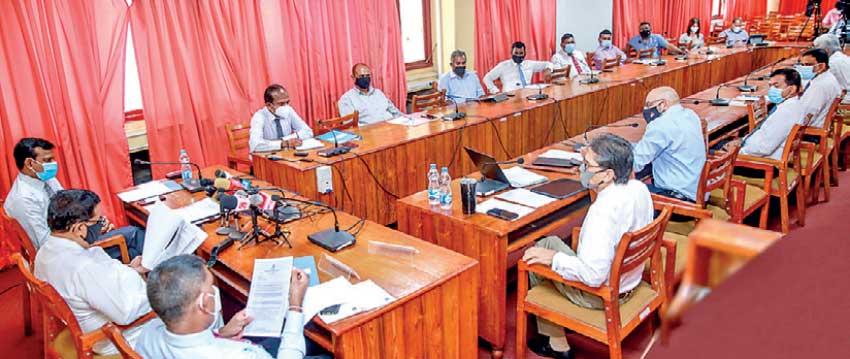11 Jan 2022 - {{hitsCtrl.values.hits}}

By Nishel Fernando
Sri Lanka’s private sector employers, led by the Employers’ Federation of Ceylon (EFC), yesterday urged the government to refrain from forcing them to pay the Rs.5000 allowance to their employees and said their financial difficulties have been worsened by the ongoing foreign exchange crisis and global supply issues.
“The concerted view of the private sector is that the government should refrain from the salary bargaining process in the private sector and the government should allow the employers and employees to reach amicable solutions based on future market situations and plans,” EFC Director General and Chief Executive Officer Mangala Yapa said, following a meeting with Labour Minister Nimal Siripala de Silva, yesterday.
Elaborating on the financial difficulties faced by the private sector firms, he pointed out that the private sector firms cannot pass the increase in cost of production to the final consumer, given the current state of the economy and competition in export markets.
“Currently, the industries are trying to come out of the doldrums, after two years of very difficult situation. The sector is trying to get up. If any additional costs are to incur, it will seriously affect the sustainability of the private sector and most likely these companies will not be able to survive because these costs cannot be passed on to the end consumer, in particular in the export sector; you need to maintain the export cooperativeness. Even in the local market, they cannot pass the cost to the consumers, as the economy is in a difficult situation, as the consumer cannot afford any price increases. So, to maintain this balance is very difficult,” Yapa elaborated.
He also noted that the exporters are struggling to maintain their margins while staying competitive, due to the mandatory export earning conversion rule imposed by the Central Bank (CB).
“Currently, there is a severe forex issue and the exchange rate is also a major concern because the exporters have to convert their earnings to rupees at Rs.200, which is 20 percent below the market rate. This again has impacted their competitiveness globally,” he added.
The high shipping costs have also impacted both importers and exporters, hurting the country’s competitiveness.
As the debt moratorium period granted by the CB coming to an end in March this year, Yapa stressed that the private sector is also faced with challenges in repaying the loans starting from this March.
However, he noted that the majority of the private sector employers have already granted an increase in payments, either in the form of salaries or other allowances.
“Most of the companies have already given such increases to the employees in a way of salary increases and other allowances. The remaining companies will take measures to grant such allowances within the next two to three months. This is an annual occurrence in the private sector, unlike the public sector,” he said.
Meanwhile, the EFC is expected to submit a memorandum in writing to de Silva today.
“Today (Monday), we had a long discussion with the Employers’ Federation and private sector employers, in order to find a lasting solution for the payment of the Rs.5,000 allowance for the private sector employees. All the representatives, who came for the meeting, raised various concerns and grievances saying that they cannot make this payment. I will submit this to the Cabinet of Ministers and we will arrive at a decision,” he said.
Last week, the key trade unions representing the private sector employees requested de Silva to extend the Rs.5,000 allowance announced for the public sector to the private sector employees as well, through legislative measures.
De Silva noted that the concerns and grievances expressed by the EFC and private sector employers, in terms of extending the Rs.5000 allowance to their employees, would be submitted to the Cabinet of Ministers along with the requests made by the private sector trade unions last week.
23 Apr 2024 6 hours ago
23 Apr 2024 7 hours ago
23 Apr 2024 8 hours ago
23 Apr 2024 23 Apr 2024
23 Apr 2024 23 Apr 2024